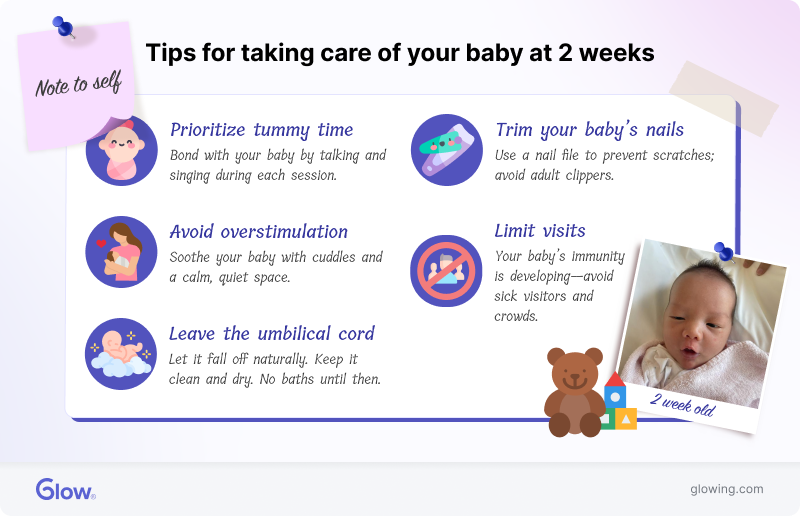Baby Month by Month
2-Week-Old Baby
Your baby’s eyes may now be able to track objects.

While you dote on your baby and enjoy all those cute moments with her, you also need to juggle changing diapers, feeding her, and sneaking in some naps when you get the chance. All the while, she’s growing and developing.
Read on to learn about your baby’s latest milestones, as well as some tips on how to take care of her—and yourself.
Your baby’s development and milestones at 2 weeks
At this stage, your little one is enjoying her life, sleeping, eating, and pooping all day long. She can’t do much for herself just yet, but make no mistake, she’s making great developmental strides.
Thanks to all the milk you’ve been giving your baby, she may have regained or surpassed her birth weight by now (after shedding a little weight after coming into the world). 1
Her other big milestones this week include:
- Brain development: Your baby is getting better at observing her surroundings, and her brain is busy switching between being alert and sleepy.
- Eye development: At this stage, your baby’s eyes may be able to track objects, but they’re still uncoordinated, and she can’t see very far away yet. 2 On that note, your baby’s eye color isn’t settled yet, and may change in the following months.
- Neck and shoulder muscles: As your baby develops more muscles in her neck and shoulders, you may notice she’s getting better at lifting her head.
Be prepared to see your baby’s first growth spurt around this time. 3 She might become hungrier and fussier, and you’ll need to feed her more often.
Your baby’s feeding routine at 2 weeks
After over a week, you’ve probably found your rhythm in feeding your baby. Here’s what feeding a 2-week-old is like:
If you’re breastfeeding
During this period, you’ll need to nurse your baby quite frequently. You should breastfeed her at least 8 times every 24 hours; it’s normal to breastfeed her up to 10–12 times a day. Each feeding typically lasts around 10–30 minutes. 4
As mentioned, if your baby is having a growth spurt, she might be fussier and need to have meals even more frequently (known as cluster feeding). This can be tiring, but it’s worth the work, as you’re giving your baby all the nutrition she needs. Know that the more often she feeds, the more your body will step up your milk production to compensate. 5
If breastfeeding is painful or you have other issues with it, see a lactation consultant. They’ll help you breastfeed more smoothly and ensure your baby gets enough milk.
If you’re formula feeding
According to health experts, breastfeeding is healthier for both mom and baby. However, the reality is that exclusively breastfeeding isn’t practical for all women. 6
If you can’t breastfeed, don’t worry; this doesn’t make you a bad mom. You can still give your baby all the nutrition she needs with infant formula and bond with her during feeds. 6
There are also benefits to formula feeding—mainly that you can get more rest (which you’re probably craving). Family and friends can also help bottle-feed your baby, and formula-fed babies typically eat less often than breastfed babies because they digest formula more slowly. 6
That said, you’ll still need to feed your baby about every 3–4 hours at this stage. 7 If you didn’t use the formula you prepared right away, you can store it in your fridge for up to 24 hours. 8 Sterilize baby bottles and nipples before feeding your baby to keep her healthy.
Your baby’s sleep patterns at 2 weeks
Your baby needs a lot of sleep, especially during these first few weeks of her life. At 2 weeks, she’ll typically sleep up to 17 hours a day (about 8 hours of napping in the day and 8–9 hours at night). 9
That said, her sleep patterns are still erratic, and she can’t sleep for long stretches just yet. Until she’s around 5 weeks old or 6 weeks old, she’ll probably be incapable of sleeping for more than 5 hours at a time because she needs to eat often (babies can’t sleep through the night until they reach 3–6 months). 9
In a similar vein, she probably won’t be able to stay awake for very long, either. Her age-dependent wake windows will probably keep her up for just 30–90 minutes at a time.
Don’t worry about your newborn sleeping too much or too little. All of this is perfectly normal. Your baby has a chaotic sleep cycle because she wasn’t born with a circadian rhythm in place yet. This is the internal clock that people use to tell day from night. 10 To help her establish a solid rhythm, expose her to light and noise during the daytime and keep her in a dim and quiet room in the evening. 11
Safe sleeping practices
Follow these sleeping practices to ensure your baby stays safe:
- Put your baby to sleep on her back in a bassinet or crib near your bed.
- Don’t let your baby sleep on a car seat, baby seat, or swings.
- Don’t leave loose items, such as blankets, pillows, and toys, where she sleeps.
- Don’t co-sleep with your baby; as tempting as it might be, it just isn’t safe. Doctors believe that co-sleeping can increase the risk of the (alarmingly named) condition “sudden infant death syndrome” (SIDS). 12
Common health concerns in 2-week-old babies
While most babies progress healthily and happily, sometimes health issues can pop up. Most common issues don’t warrant much more than a little TLC, but it’s important to keep an eye on your little one’s health. Here’s what you might observe:
- Red birthmarks: Areas where small blood vessels are very close to each other are called strawberry hemangiomas. They’re a type of birthmark and are usually harmless. Tell your pediatrician about it so they can monitor it. 13
- Epstein pearls: Don’t panic if you notice small white spots on your baby’s gum line or the roof of her mouth. They’re most likely small, keratin-filled cysts called Epstein pearls, which are normal and not harmful to your baby. They should clear up by themselves within a few weeks.
- Rashes or eczema: Your baby’s skin is very sensitive and may develop rashes or eczema. Ask your pediatrician about the best way to treat them.
- Blocked tear ducts: If her eyes are watery and have some crusty discharge, that might signify she has blocked tear ducts. If this happens, gently massage the area between her eye and nose 2–3 times a day with a clean finger. 14
- Eye infections: If you notice yellow discharge or pus around her eyes, call your pediatrician; they may prescribe antibiotic eye drops.
- Crossed eyes: It’s normal for newborns to have crossed eyes. This usually goes away after a few months. However, if your baby can’t make eye contact and still has crossed eyes at 3 months old to 4 months old, she may need medical attention. 15
- Constipation: It’s normal for babies to grunt or cry when they have gas or a bowel movement, as their abdominal muscles are weak—that doesn’t mean your little one is constipated. 16 If your baby isn’t pooping or often has hard, dry stools, then call your doctor.
- Colic: Your baby might have colic if she cries over 3 hours a day. This isn’t a health issue, despite the opaque and slightly scary name; it simply means your baby is extra fussy. There isn’t much you can do about it, but it’ll usually get better at around week 6 and go away completely when your baby is 3 months old. 17
- Moles: Some babies have moles when they’re born, which are usually harmless. Still, if your baby has a mole, monitor it and let your doctor know if it’s asymmetrical, gets bigger, or changes color.
- Baby acne: This usually harmless condition tends to pop up within a baby’s first six weeks of life and then tapers off by the time they’re 4 to 6 months old. You may see breakouts around your baby’s face (cheeks, nose, and forehead) and other areas like her back, scalp, neck, and chest.
Don’t panic if you notice your baby has any of these issues—she’s probably fine. That said, your pediatrician is always on hand should you have any concerns or just need a little reassurance.
Consider keeping track of your baby’s symptoms in your diary or baby tracker app in case you do need to talk to your pediatrician about them. The best baby trackers can also recommend tips for managing those symptoms.

Tips for taking care of your baby at 2 weeks
Here’s how you can take care of your little one and make sure she keeps progressing well:
- Prioritize tummy time: This is a great time to bond with your baby, as well as help her boost her abdominal strength and minimize the risk of her developing a flat head. Keep giving your baby regular tummy time. You can talk, sing, and make eye contact with her during these sessions.
- Watch out for overstimulation: If your baby is overstimulated, try calming her down by cuddling, stroking, or patting her, or try to take her somewhere calmer and quieter. 18
- Leave her umbilical cord: If your baby’s umbilical cord hasn’t detached by this point, leave it be; it’ll eventually fall off on its own. In the meantime, keep the stump clean and dry. You can use a sponge to clean the rest of her body, but don’t put her in water until the stump falls off. 19
- Trim her nails: Your baby’s nails grow fast. Trim them regularly so she doesn’t scratch her face. Don’t use adult-sized nail clippers—you might clip her fingers. Use a nail file or emery board instead. 20
- Lay off the visits: While your family and friends are likely dying to meet your little bundle of joy, remember that her immune system is still maturing at 2 weeks old. 21 Don’t expose her to too many people at once, and make sure no one who meets her is sick. It’s okay to turn down a visit if you don’t feel comfortable letting that person near your baby at the moment.
Common postpartum symptoms and how to manage them
Your own body is still in recovery during this time. You’ll feel much stronger as time goes on, but at present, you may have:
- Pain and discomfort: You may still feel the lingering effects of childbirth. For instance, if you had a vaginal birth, it can be painful to sit down. If you had a C-section, it may hurt when you bend over.
- Swelling: If you had a vaginal birth, you might see swelling in your perineal area (between your vagina and rectum) and feel itchiness. 22 C-section scars can also be sore and sensitive.
- Uncomfortable bowel movements: Some women will have uncomfortable bowel movements for weeks after they give birth. Drink lots of fluids, eat more fiber, and use stool softeners to ease your constipation.
- Postpartum depression: You may struggle with postpartum depression after you’ve given birth. There are many factors that can lead to this (e.g., changes in hormone levels, decreased sleep, and your social life), but the exact cause is still unknown.
- Postpartum rage: Similarly, you may experience postpartum rage, meaning you may become easily irritated and have intense outbursts. See your doctor immediately if there have been severe and uncontrollable changes to your mood after having your baby.
How to look after yourself
Don’t forget to take care of yourself while you look after your baby. Follow these tips to improve your well-being:
- Eat well and stay hydrated: Maintain a balanced breastfeeding diet and drink lots of water. It’s important to eat nourishing foods to provide nutrients for your baby.
- Kegel exercises: Do Kegel exercises to improve your circulation, speed your body’s healing, strengthen your muscles, and regain your bladder control. 23
- Go outside and socialize: With so much going on with your little one, you might have forgotten about life outside of motherhood. Getting fresh air and meeting other people can boost your mood and give you a much needed break from dirty diapers. If you’re struggling with mental health issues, talking to other people can make you feel supported and less alone.
Above all, be patient with yourself. There’s only so much you can do to speed up the recovery process. At the end of the day, you need to relax and give your body enough time to heal.
Final thoughts
Your second week with your baby may be as exciting as it is overwhelming. While you’ll face new challenges taking care of her, you’ll get the hang of it shortly.
Remember that both you and your baby are learning and adapting to your new life together. No one’s born a natural parent, so don’t be hard on yourself if you find it hard. Enjoy all the time you spend with your newborn—you’ll be surprised how quickly she’ll grow up. If you ever need help, don’t be shy to reach out to your loved ones, and just keep going!
Article Sources
- National Health Service. "Your baby's weight and height" Retrieved July 16, 2025.
- University of Rochester Medical Center. "Newborn Senses" Retrieved July 16, 2025.
- University of Rochester Medical Center. "Breastfeeding: Getting Started" Retrieved July 16, 2025.
- Children’s Mercy . "Is My Baby Getting Enough Milk?" Retrieved July 16, 2025.
- WIC Breastfeeding Support. "Low Milk Supply" Retrieved July 16, 2025.
- MedlinePlus. "Breastfeeding vs. formula feeding" Retrieved July 16, 2025.
- U.S. Centers for Disease Control and Prevention. "How Much and How Often to Feed Infant Formula" Retrieved July 16, 2025.
- U.S. Food & Drug Administration. "Infant Formula: Safety Do's and Don'ts" Retrieved July 16, 2025.
- The Children's Hospital of Philadelphia. "Healthy Sleep Habits" Retrieved July 16, 2025.
- National Institute of General Medical Sciences. "Circadian Rhythms" Retrieved July 16, 2025.
- MedlinePlus. "Bedtime habits for infants and children" Retrieved July 16, 2025.
- MedlinePlus. "Sudden infant death syndrome" Retrieved July 16, 2025.
- MedlinePlus. "Red birthmarks" Retrieved July 16, 2025.
- MedlinePlus. "Blocked tear duct" Retrieved July 16, 2025.
- American Academy of Pediatrics. "Warning Signs of Vision Problems in Infants & Children" Retrieved July 16, 2025.
- MedlinePlus. "Constipation in infants and children" Retrieved July 16, 2025.
- MedlinePlus. "Colic and crying - self-care" Retrieved July 16, 2025.
- Texas Health. "Signs Your Baby Is Overstimulated" Retrieved July 16, 2025.
- MedlinePlus. "Umbilical cord care in newborns" Retrieved July 16, 2025.
- MedlinePlus. "Nail care for newborns" Retrieved July 16, 2025.
- The Children's Hospital of Philadelphia. "Development of the Immune System" Retrieved July 16, 2025.
- Cambridge University Hospitals. "Perineum care after childbirth" Retrieved July 16, 2025.
- Allina Health. "Exercise after birth" Retrieved July 16, 2025.






